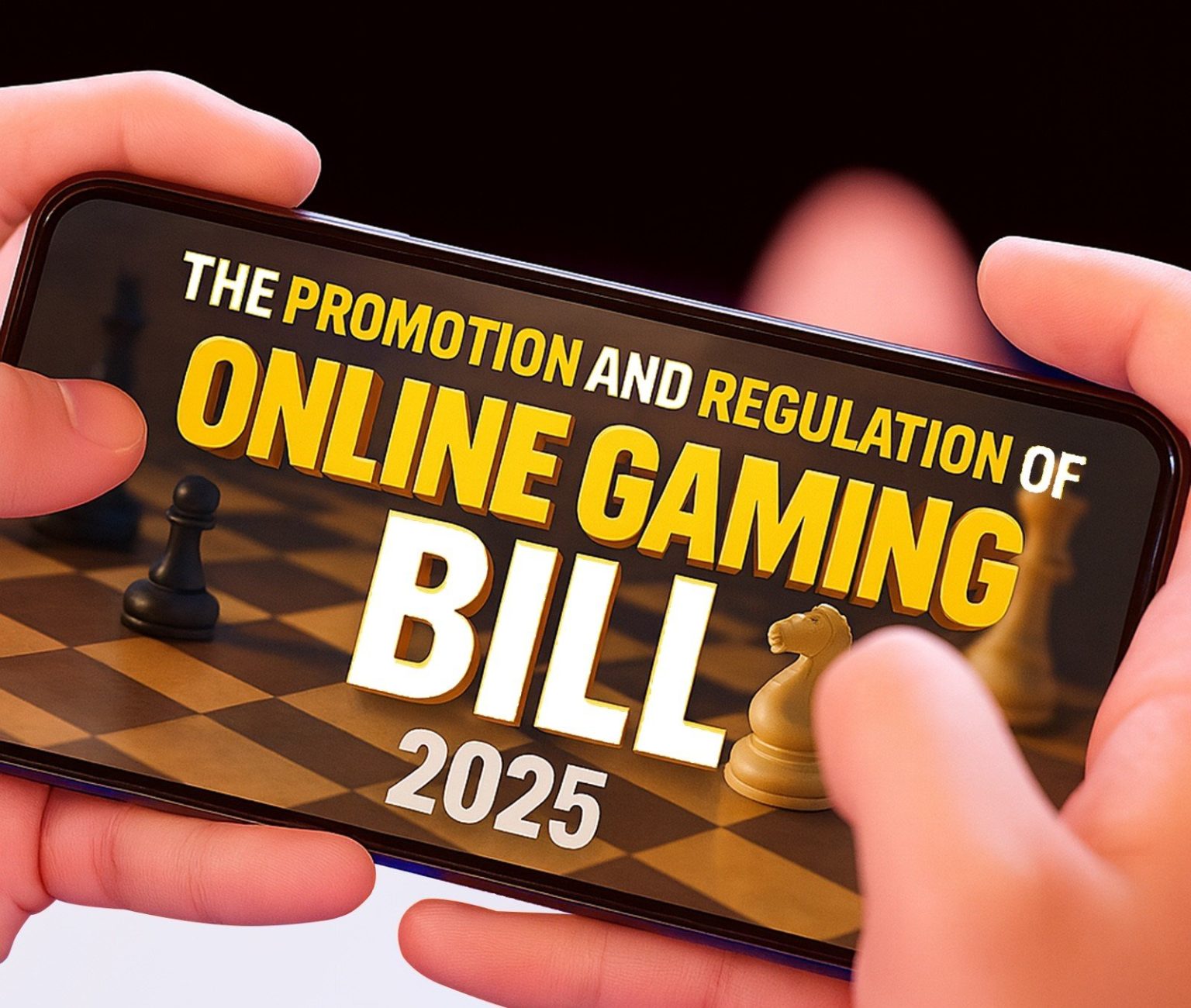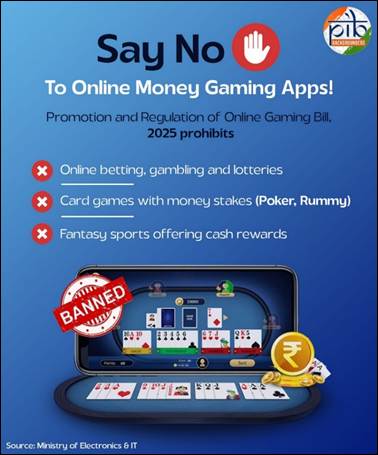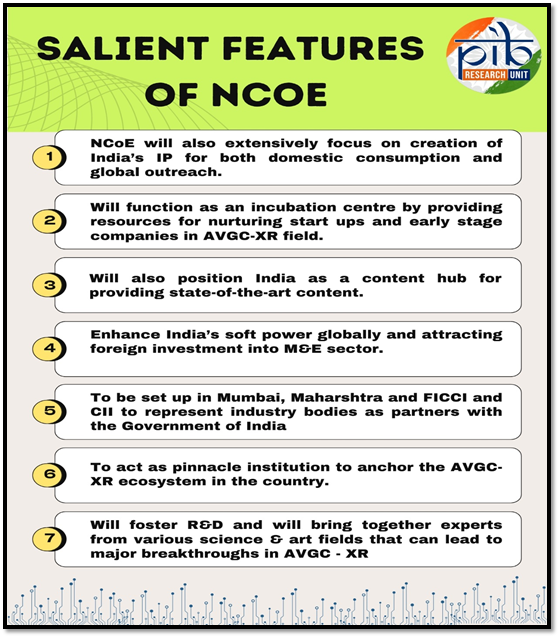Draft Rules for Online Gaming

- 06 Oct 2025
In News:
The Ministry of Electronics and Information Technology (MeitY) has released the draft Promotion and Regulation of Online Gaming Rules, 2025, intended to operationalise the Promotion and Regulation of Online Gaming (PROG) Act, 2025. The government has also invited public feedback on the draft rules till the end of this month via email submission.
Objective
The draft rules aim to establish a comprehensive national framework for regulating the online gaming ecosystem in India. They seek to differentiate legitimate e-sports and social gaming from real money gaming (RMG) platforms, thereby ensuring user protection, transparency, and responsible innovation.
Key Provisions
1. Ban on Real Money Gaming: The Act prohibits real money gaming (RMG) — including online poker, rummy, fantasy sports, and betting — where players wager or stake money for potential returns. Only social games and e-sports, meant for recreation, education, or skill development, are permitted.
2. Establishment of the Online Gaming Authority of India (OGAI): A dedicated regulatory body, the Online Gaming Authority of India (OGAI), will be set up to oversee the sector.
- Composition: A Chairperson and five members representing different ministries.
- Powers: Quasi-judicial authority to summon individuals, examine evidence, and issue binding directions.
- Functions:
- Determine whether a game qualifies as an “online money game.”
- Register and certify online social games and e-sports.
- Impose penalties, suspend or cancel registrations for violations.
- Ensure compliance with ethical and revenue guidelines.
3. Registration Framework
- Mandatory Registration: All social and e-sports games must register with OGAI.
- Validity: Registration certificates will remain valid for up to five years.
- Disclosure Requirements: Companies must declare revenue sources and user protection measures.
- Revenue must originate from advertising, subscriptions, or access fees, not wagers or stakes.
4. Penalties and Offences
- Offering or operating an online money gaming service: up to 3 years’ imprisonment and ?1 crore fine.
- Advertising such platforms: up to 2 years’ imprisonment and ?50 lakh fine.
- Offences are non-bailable, and company officials can be held personally liable.
- Penalty quantum will depend on extent of gain, user loss, and frequency of violation.
5. Grievance Redressal Mechanism (Three-Tiered)
- Internal redressal unit of the gaming company.
- Grievance Appellate Committee (GAC) under the IT Rules, 2021.
- Online Gaming Authority of India (OGAI) as the final appellate body.
6. Role of Various Ministries
- Ministry of Electronics & IT (MeitY): Nodal authority for overall regulation.
- Ministry of Youth Affairs: Oversight of e-sports.
- Ministry of Information & Broadcasting (I&B): Regulation of social games, including issuing codes of practice and classification guidelines.
Online Gaming Bill, 2025

- 23 Aug 2025
In News:
- The Promotion and Regulation of Online Gaming Bill, 2025, passed by Parliament, represents a landmark intervention in India’s digital policy.
- It seeks to prohibit exploitative online money games while simultaneously promoting e-sports and safe online social games.
- The legislation balances the twin objectives of protecting citizens, especially the middle class and youth, from financial and psychological harm and leveraging the potential of the online gaming industry as a driver of innovation, employment, and global competitiveness.
Rationale for the Bill
- The rapid proliferation of online money gaming platforms has led to addiction, financial ruin, fraud, and even suicides.
- The World Health Organization has classified “gaming disorder” as a health condition, reinforcing the urgency of regulation. According to government estimates, 45 crore people were adversely impacted, with losses exceeding ?20,000 crore.
- These platforms also posed risks of money laundering, terror financing, and cybercrime, exploiting loopholes in existing laws. With most operators based offshore, regulatory gaps persisted. Therefore, the Bill provides a comprehensive legal framework that integrates social protection with sectoral growth.
Understanding the Online Gaming Sector
- E-Sports – Organised competitive digital sports that foster strategy, teamwork, and discipline.
- Online Social Games – Recreational, skill-based, and educational games designed for safe entertainment and learning.
- Online Money Games – Games involving financial stakes, often associated with addiction, fraud, and economic distress.
The Bill encourages the first two categories while imposing a blanket ban on money games.
Key Provisions of the Bill
- Applicability: Extends to all of India, including offshore platforms offering services within India.
- Promotion of E-Sports: Recognised as a legitimate sport; guidelines to be framed by the Ministry of Youth Affairs and Sports, with support for training academies and tournaments.
- Encouragement of Social/Educational Games: Central Government to register safe games and develop platforms for digital literacy and skill-building.
- Ban on Online Money Games: Prohibition on offering, advertising, or facilitating such games; banks barred from processing related transactions.
- Online Gaming Authority: A national regulator to classify games, enforce compliance, and address grievances.
- Penalties: Up to 3 years imprisonment and ?1 crore fine for violations; harsher penalties for repeat offenders.
- Corporate Liability: Companies and responsible officers held accountable, with protection for independent directors.
- Investigative Powers: Authorised officers may search, seize, and arrest under the Bharatiya Nagarik Suraksha Sanhita, 2023.
Complementary Legal Measures
- IT Act, 2000 and Intermediary Rules, 2021 – Empower government to block illegal platforms; 1,524 sites already blocked.
- Bharatiya Nyaya Sanhita, 2023 – Criminalises betting and unlawful economic activities.
- GST Act, 2017 – Extends taxation compliance to offshore gaming platforms.
- Consumer Protection Act, 2019 – Prohibits misleading advertisements; celebrities warned against endorsing betting apps.
- Advisories and Education Guidelines – Awareness campaigns on safe gaming for parents, teachers, and youth.
Societal Benefits
- Consumer Protection: Shields families from predatory gaming platforms.
- Youth Empowerment: Expands avenues for e-sports careers and skill-based learning.
- Digital Economy Growth: Positions India as a global gaming hub, driving innovation, exports, and jobs.
- National Security: Prevents misuse of platforms for illicit financing or propaganda.
- Global Leadership: Establishes India as a model for responsible digital regulation.
Conclusion
The Promotion and Regulation of Online Gaming Bill, 2025 reflects India’s attempt to balance innovation with responsibility. By banning harmful money games while nurturing e-sports and educational platforms, the Bill not only safeguards citizens but also unlocks opportunities in the digital economy. It exemplifies a preventive yet progressive regulatory approach, aligning national security, youth welfare, and economic growth. Ultimately, it ensures that technology remains a tool for empowerment, not exploitation.
AVGC: The Future of Media & Entertainment Industry

- 30 Sep 2024
Introduction
- The AVGC (Animation, Visual Effects, Gaming, Comics) sector is set to be the future of the media and entertainment industry.
- According to the FICCI-EY 2024 report, India now boasts the second-largest anime fan base globally and is projected to contribute 60% to the worldwide growth in anime interest in the coming years.
- In a significant step toward making India a global hub for AVGC, the Union Cabinet recently approved the establishment of a National Centre of Excellence (NCoE) for Animation, Visual Effects, Gaming, Comics, and Extended Reality (AVGC-XR) in Mumbai.
NCoE Background
- NCoE will be set up as a Section 8 Company under the Companies Act, 2013 in India with Federation of Indian Chambers of Commerce & Industry and Confederation of Indian Industry representing the industry bodies as partners with the Government of India.
- The establishment of the NCoE follows the Union Minister of Finance and Corporate Affairs 2022-23 budget announcement, which proposed the creation of an AVGC task force in the country.
- NCoE AVGC aims at creating a world class talent pool in India to cater to the Indian as well as global entertainment industry.
- Provisionally named the Indian Institute for Immersive Creators (IIIC), this center aims to revolutionize the AVGC sector and foster innovation in immersive technologies.
- It will be modeled after renowned institutions like the Indian Institutes of Technology (IITs) and Indian Institutes of Management (IIMs).
Objective of NCoE (IIIC)
Boasting a growth rate of 25% and an estimated value of ?46 billion by 2023 (FICCI-EY Report 2023), the animation industry in India is thriving and offers a promising future for passionate young talent.
Below are some of the key objectives of the NCoE (IIIC):
- Focusing of creating Indian IP
- Leveraging our cultural heritage in new age
- Create a multiplier effect in the industry
- An industry led initiative, in partnership with state and academia
- Integrated focus on education, skilling industry, development, innovation
- Hub and spoke model of development to be followed
- IIIC as the hub and several center’s as its spokes dedicated innovation and research fund to promote start-up ecosystem
Conclusion
The Union Cabinet's approval of the National Centre of Excellence (NCoE) for AVGC marks a pivotal step in strengthening India’s media and entertainment industry. This initiative is set to boost the economy while creating new job opportunities in the rapidly growing AVGC sector. As a global hub for filmmaking, India's advancements in technology and infrastructure will enable the production of high-quality content, positioning the country as a leader in technological innovation and creativity.
Digital Detox for Responsible Gaming (TOI)

- 02 Feb 2024
Why is it in the News?
The Karnataka government recently said it would launch a 'Digital Detox' initiative in collaboration with the All India Game Developers Forum (AIGDF), with special emphasis on gaming and social media.
What is Digital Detox?
- A digital detox entails voluntarily refraining from using digital devices like smartphones, computers, and social media platforms for a defined period.
- This period can range from a few hours to as long as a week or even a month.
- Research indicates that approximately 25% of smartphone owners aged 18 to 44 cannot recall the last time they were separated from their phones.
Benefits:
- Overcoming Technology Addiction: Studies reveal that around 61% of individuals acknowledge their addiction to the internet and digital screens.
- A digital detox aids in combating this addiction.
- Enhanced Mental Health: Disconnecting from technology can alleviate stress and anxiety, thereby fostering improved mental health and overall well-being.
- Increased Productivity and Creativity: Taking a break from continuous digital engagement bolsters focus and concentration, leading to heightened productivity and creativity.
- Improved Sleep: Excessive screen time has been linked to poor sleep quality. A digital detox helps in promoting better sleep by reducing exposure to blue light and stimulating content.
- Enhanced Communication Skills: Reducing online time allows for more face-to-face interactions, nurturing better communication skills and social connections.
Challenges:
- Feelings of Disconnection: Detox participants may feel disconnected from friends and family members.
- Fear of Missing Out: Participants may experience FOMO (fear of missing out) or anxiety about missing important information.
- Boredom or Restlessness: Detoxes may lead to feelings of boredom or restlessness.
- Withdrawal Symptoms: Some individuals may experience withdrawal symptoms such as anxiety or boredom.
Way forward:
- Start Small: Initiate the detox with shorter periods and gradually extend the duration.
- Inform Others: Notify friends and family about the detox to avoid misinterpretations.
- Engage in Healthy Activities: Utilize detox time for activities like reading, spending time outdoors, or exercising.
- Minimize Notifications: Turn off device notifications and store them out of sight.
- Reward Progress: Offer yourself incentives for achieving detox goals.
Conclusion
Digital dependence can contribute to mental health issues, shorter attention spans, and strained interpersonal relationships. While technology offers convenience and connectivity, excessive screen time exacts a toll. A digital detox presents an opportunity to enhance mental and physical well-being, as well as nurture healthier relationships. With proper planning and commitment, a successful and fulfilling detox experience is achievable.
